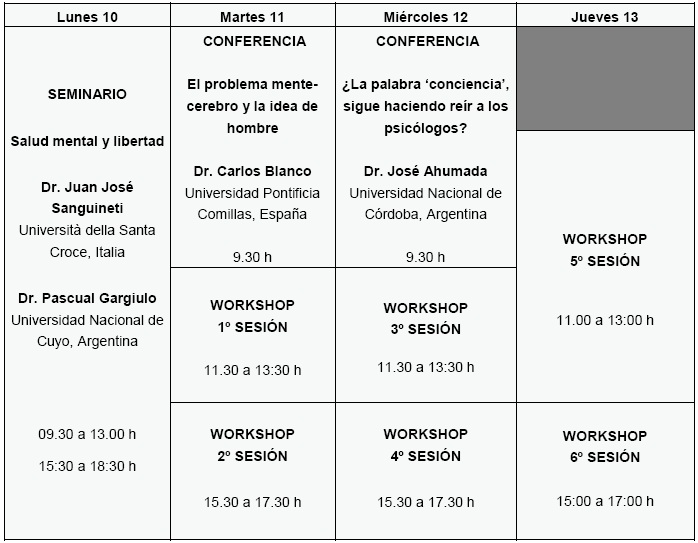Determinismo e Indeterminismo: De la Neurociencia a la Filosofía
Cronograma
Workshop
Primer día: Filosofía de la ciencia. La Filosofía pregunta a la Neurociencia
1. ¿Cómo se relacionan entre sí los diferentes niveles epistemológicos de las ciencias cognitivas, la psicología y la neurociencia? Las descripciones y explicaciones neurológicas, ¿ofrecen una visión determinista o indeterminista?
Ponentes:
Filosofía: Ivana Anton Mlinar, Universidad Nacional de Cuyo
Neurociencia: Martín López Vicchi, Universidad Austral
Bibliografía:
BRASS, LYNN & DEMANET, “Imaging volition: what the brain can tell us about the will”, Experimental Brain Research 229:3 (2013), pp. 301-312.
GLANNON, “Our Brains Are not Us”, Bioethics 23:6 (2009), pp. 321-329.
2. ¿Es viable un dualismo epistemológico o semántico de lo mental y lo neural sin alguna clase de dualidad ontológica, como la de mente y cuerpo?
Ponentes:
Filosofía: Juan Francisco Franck, Universidad Austral
Neurociencia: Luis Echarte, Universidad de Navarra
Bibliografía:
RICOEUR & J.-P. CHANGEUX, Lo que nos hace pensar, Barcelona: Península, 1999, pp. 171-180.
DENNETT, “Why and How Does Consciousness Seem the Way it Seems?”, en T. METZINGER & J. M. WUNDT (eds.), Open MIND. Frankfurt am Main: MIND Group, 2015, pp.1-11.
Segundo día: Filosofía de la Neurociencia. La Neurociencia pregunta a la Filosofía
3. ¿Puede una estructura compleja y organizada, como el cerebro, ser asiento de una causación mental no-reduccionista compatible con la libertad?
Ponentes:
Neurociencia: Pablo Brumovsky, Universidad Austral
Filosofía: Miguel García Valdecasas, Universidad de Navarra
Bibliografía:
S. GAZZANIGA, Who’s in Charge?: Free Will and the Science of the Brain. New York: Ecco – Harper Collins, 2012, pp. 105-141; 217-220.
MURPHY, “Avoiding neurobiological reductionism: the role of downward causation in complex systems”, en J. J. SANGUINETI, A. ACERBI & J. A. LOMBO (eds.), Moral Behavior and Free Will. A Neurobiological and Philosophical Approach. Vatican City: IF Press, 2011, pp. 200-222.
4. ¿Son compatibles los procesos neurobiológicos con el establecimiento de fines, especialmente por parte de un agente voluntario? ¿Es posible hablar de finalidad y de libre albedrío sin un marco de referencia indeterminista?
Ponentes:
Neurociencia: Ángela Suburo, Universidad Austral
Filosofía: José Ignacio Murillo, Universidad de Navarra
Bibliografía:
I. MURILLO. “Is there room for the will in neuroscientific research? Philosophical reflections on some neuroscientific approaches to emotions and behavior”, in J. J. SANGUINETI, A. ACERBI & J. A. LOMBO (eds.), Moral Behaviorand Free Will. A Neurobiological and Philosophical Approach, Vatican City: IF Press, 2011, pp. 61-79.
S. UITHOL, D. C. BURNSTON, P. HASELAGER, “Why we may not find intentions in the brain”, Neuropsychologia 56 (2014): 129-139.
Tercer día: Neurociencia y Religión. La Neurociencia pregunta a la Teología Natural
5. ¿Es la mente humana una propiedad emergente de sistemas neurales supercomplejos? ¿Es posible hablar de alma humana en un discurso neurobiológico?
Ponentes:
Neurociencia: Marcelo Villar, Universidad Austral
Filosofía: Juan José Sanguineti, Università della Santa Croce
Bibliografía:
S. JEFFREYS, “The Soul is Alive and Well: Non-reductive Physicalism and Emergent Mental Properties”, Theology and Science 2:2 (2004), pp. 205-225 (dx.doi.org/10.1080/1474670042000261105).
U. MEIXNER, “The Indispensability of the Soul”, in B. NIEDERBACHER & E. RUNGGALDIER (eds.), Die menschliche Seele. Brauchen wir den Dualismus?, Frankfurt: Ontos, 2006, pp. 19-40.
6. ¿Es posible distinguir entre libre albedrío y libertad? ¿Es compatible el concepto de libertad personal con la investigación neurocientífica?
Ponentes:
Neurociencia: Carlos Blanco, Universidad Pontificia Comillas
Filosofía: Juan Pablo Roldán, Universidad Católica Argentina
Bibliografía:
LIBET, “Do we have free will?”, in R. Kane (ed.), Oxford Handbook of Free Will, Oxford: Oxford UP, 2005, pp. 552-564.
J. SANGUINETI, “Libertad y base cerebral”, Conferencia pronunciada en la Universidad Católica Argentina, 17 de septiembre de 2008.




 English
English Español
Español